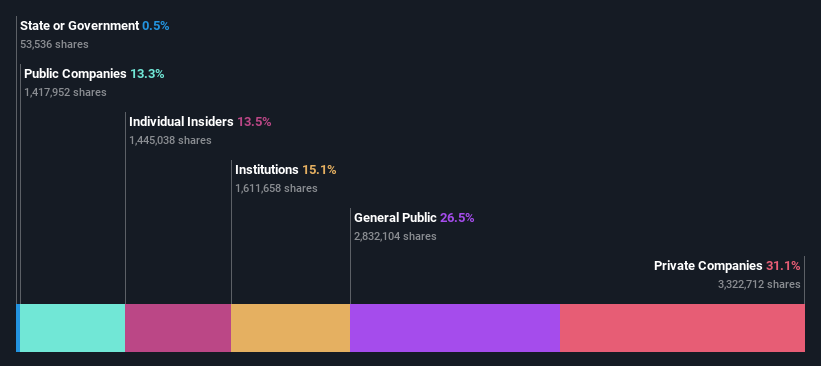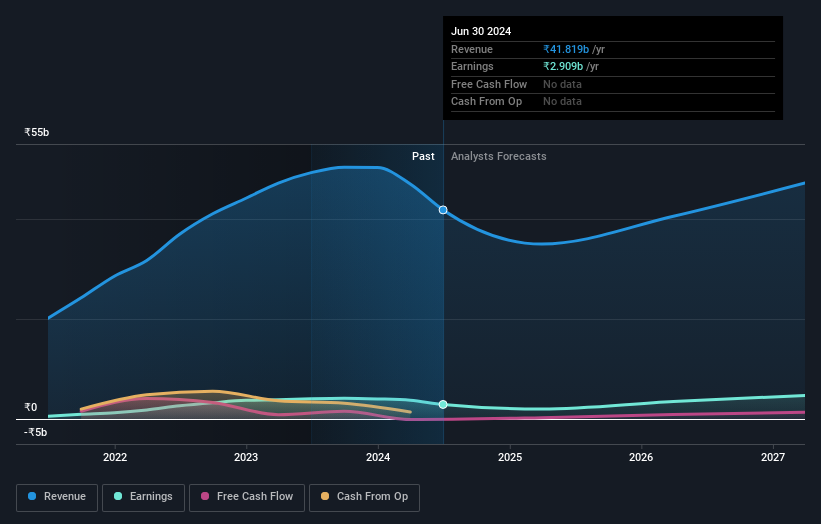Private companies invested in LMW Limited (NSE:LAXMIMACH) copped the brunt of last week's ₹8.6b market cap decline

Key Insights
- The considerable ownership by private companies in LMW indicates that they collectively have a greater say in management and business strategy
- The top 10 shareholders own 52% of the company
- Insider ownership in LMW is 14%
A look at the shareholders of LMW Limited (NSE:LAXMIMACH) can tell us which group is most powerful. We can see that private companies own the lion's share in the company with 31% ownership. In other words, the group stands to gain the most (or lose the most) from their investment into the company.
As a result, private companies as a group endured the highest losses last week after market cap fell by ₹8.6b.
In the chart below, we zoom in on the different ownership groups of LMW.
See our latest analysis for LMW

What Does The Institutional Ownership Tell Us About LMW?
Many institutions measure their performance against an index that approximates the local market. So they usually pay more attention to companies that are included in major indices.
We can see that LMW does have institutional investors; and they hold a good portion of the company's stock. This suggests some credibility amongst professional investors. But we can't rely on that fact alone since institutions make bad investments sometimes, just like everyone does. When multiple institutions own a stock, there's always a risk that they are in a 'crowded trade'. When such a trade goes wrong, multiple parties may compete to sell stock fast. This risk is higher in a company without a history of growth. You can see LMW's historic earnings and revenue below, but keep in mind there's always more to the story.

LMW is not owned by hedge funds. Lakshmi Cargo Company Limited is currently the company's largest shareholder with 10% of shares outstanding. In comparison, the second and third largest shareholders hold about 8.8% and 6.5% of the stock. Additionally, the company's CEO Sanjay Jayavarthanavelu directly holds 1.3% of the total shares outstanding.
We did some more digging and found that 10 of the top shareholders account for roughly 52% of the register, implying that along with larger shareholders, there are a few smaller shareholders, thereby balancing out each others interests somewhat.
While it makes sense to study institutional ownership data for a company, it also makes sense to study analyst sentiments to know which way the wind is blowing. There is some analyst coverage of the stock, but it could still become more well known, with time.
Insider Ownership Of LMW
While the precise definition of an insider can be subjective, almost everyone considers board members to be insiders. Management ultimately answers to the board. However, it is not uncommon for managers to be executive board members, especially if they are a founder or the CEO.
Insider ownership is positive when it signals leadership are thinking like the true owners of the company. However, high insider ownership can also give immense power to a small group within the company. This can be negative in some circumstances.
It seems insiders own a significant proportion of LMW Limited. Insiders own ₹25b worth of shares in the ₹181b company. That's quite meaningful. Most would be pleased to see the board is investing alongside them. You may wish to access this free chart showing recent trading by insiders.
General Public Ownership
The general public-- including retail investors -- own 27% stake in the company, and hence can't easily be ignored. This size of ownership, while considerable, may not be enough to change company policy if the decision is not in sync with other large shareholders.
Private Company Ownership
It seems that Private Companies own 31%, of the LMW stock. It might be worth looking deeper into this. If related parties, such as insiders, have an interest in one of these private companies, that should be disclosed in the annual report. Private companies may also have a strategic interest in the company.
Public Company Ownership
It appears to us that public companies own 13% of LMW. This may be a strategic interest and the two companies may have related business interests. It could be that they have de-merged. This holding is probably worth investigating further.
Next Steps:
I find it very interesting to look at who exactly owns a company. But to truly gain insight, we need to consider other information, too. Consider risks, for instance. Every company has them, and we've spotted 1 warning sign for LMW you should know about.
If you would prefer discover what analysts are predicting in terms of future growth, do not miss this free report on analyst forecasts.
NB: Figures in this article are calculated using data from the last twelve months, which refer to the 12-month period ending on the last date of the month the financial statement is dated. This may not be consistent with full year annual report figures.
New: AI Stock Screener & Alerts
Our new AI Stock Screener scans the market every day to uncover opportunities.
• Dividend Powerhouses (3%+ Yield)
• Undervalued Small Caps with Insider Buying
• High growth Tech and AI Companies
Or build your own from over 50 metrics.
Have feedback on this article? Concerned about the content? Get in touch with us directly. Alternatively, email editorial-team (at) simplywallst.com.
This article by Simply Wall St is general in nature. We provide commentary based on historical data and analyst forecasts only using an unbiased methodology and our articles are not intended to be financial advice. It does not constitute a recommendation to buy or sell any stock, and does not take account of your objectives, or your financial situation. We aim to bring you long-term focused analysis driven by fundamental data. Note that our analysis may not factor in the latest price-sensitive company announcements or qualitative material. Simply Wall St has no position in any stocks mentioned.
About NSEI:LMW
LMW
Manufactures and sells textile spinning machinery in India and internationally.
Flawless balance sheet with moderate growth potential.


